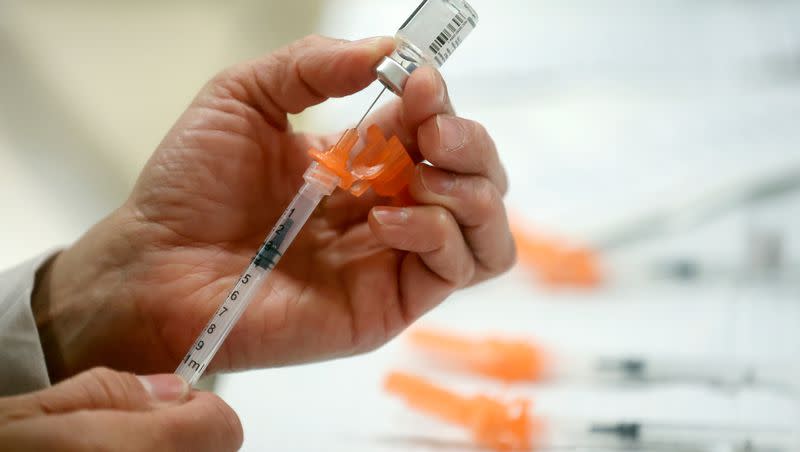‘Dramatic’ climb in COVID-19 cases at U. Health

- Oops!Something went wrong.Please try again later.
With COVID-19 cases and hospitalizations continuing to rise, now is the time for Utahns 6 months and older to get the updated vaccine, University of Utah Health officials advised Friday.
The weekly number of U. Health patients testing positive for COVID-19 at the system’s hospital in Salt Lake City and clinics around the state has jumped from a low of just 25 in mid-June to more than 200.
What started as a gradual trend upwards has gotten “even more dramatic over the past six weeks,” Dr. Russell Vinik, U Health’s chief medical operations officer, told reporters during an online news conference.
Related
“That is concerning, to see more people testing positive for COVID,” Vinik said.
But even more worrying is a similar trend in hospitalizations, he said, rising from five patients at the U. hospital in mid-June to about 15 currently. However, Vinik said no more than two patients a week have ended up in intensive care.
Nearly all of the COVID-19 patients at the U. hospital are either not vaccinated against the virus or considered under-vaccinated because they are not up-to-date with the most recent booster dose, first offered a year ago.
“It’s still holding true, that very few patients are hospitalized that are completely up-to-date on their COVID vaccinations,” Vinik said. “The vaccines are still effective and we expect this new booster to be even more effective at preventing cases and hospitalizations.”
Dr. Andrew Pavia, chief of the Division of Pediatric Infectious Diseases at U. Health, said that should be the case even though newer versions of the virus have emerged since the vaccine was reformulated.
“COVID is continuing to evolve and it’s shown us that for the last three years, it is a dynamic virus that keeps changing,” Pavia said, but tests have shown the effect of both last year’s booster shot and the updated vaccine “neutralizes the current viruses very well.”
Related
The updated vaccine, newly approved by both the Food and Drug Administration and the Centers for Disease Control and Prevention, is expected to be available in Utah next week, Kavish Choudhary, U. Health’s chief pharmacy officer, said.
“Who should get the vaccine? Pretty much anybody over the age of 6 months is eligible to receive the vaccine regardless of previous vaccination status,” Choudhary said, declaring it safe.
“We’ve got a lot more data now than we did back in 2021 showing the vaccine is safe and effective,” he said. “It’s just like any other vaccine you have out there right now. For the most part, it’s going to be very safe.”
Pavia said “it’s reasonable for really everyone over 6 months (old) who has not been infected in the last three to six months with COVID to get a vaccine because it can protect you from becoming ill.”
The protection “won’t be perfect,” he said, “but it can greatly reduce your risk of ending up in the hospital,” especially for those who are older or have health issues such as asthma, heart disease or obesity, or are pregnant.
Related
The advice comes as the state’s COVID-19 indicators also keep climbing. The seven-day average case count rose nearly 28% over the previous week, to just under 188 cases, the Utah Department of Health and Human Services reported Thursday.
The state’s hospitalizations for COVID-19 are up more than 40%, to a seven-day average of almost 64 patients, while two more Utah deaths from the virus were reported, a woman 45-64 years old and another older than 85, both from Salt Lake County.
Other points made by the U. Health officials about COVID-19 included:
Immunity to the virus fades over time, whether it’s from natural infection or vaccine. “Protection lasts only a couple of months against any infection,” Pavia said, but there’s still measurable protection against hospitalization for up to a year.
It’s because of that waning immunity, along with changes to the COVID-19, that “we need to play catch-up with the vaccine, just like we do with flu vaccine,” he said. The vaccine’s protection also fades faster with age.
Children need to be vaccinated against COVID-19 because national data shows those under 2 are being hospitalized for the virus, Pavia said, most likely because “they haven’t seen the virus before and they haven’t been vaccinated before.”
Their first infection is making them “quite ill, so I think for very young children right now, there’s a really good case for giving them vaccine,” he said. For school-age children, shots could prevent them from missing class during the recommended five-day quarantine.
Long COVID, the name for a variety of often debilitating symptoms that can linger for months or even years after a bout with the virus, is another reason to be vaccinated, Pavia said. “Frankly, that’s what scares me at this point. I don’t want to get long COVID.”

